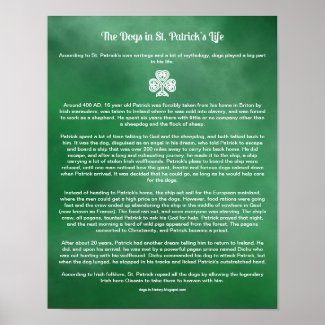2/8/20
The Dogs in Saint Patrick's Life
According to St. Patrick's own writings and a bit of mythology, dogs played a big part in his life.
Around 400 AD, 16 year old Patrick was forcibly taken from his home in Briton by Irish marauders, was taken to Ireland where he was sold into slavery, and was forced to work as a shepherd. He spent six years there with little or no company other than a sheepdog and the flock of sheep.
Patrick spent a lot of time talking to God and the sheepdog, and both talked back to him. It was the dog, disguised as an angel in his dream, who told Patrick to escape and board a ship that was over 200 miles away to carry him back home. He did escape, and after a long and exhausting journey, he made it to the ship, a ship carrying a lot of stolen Irish wolfhounds. Patrick's pleas to board the ship were refused, until one man noticed how the giant, frantic and furious dogs calmed down when Patrick arrived. It was decided that he could go, as long as he would help care for the dogs.
Instead of heading to Patrick's home, the ship set sail for the European mainland, where the men could get a high price on the dogs. However, food rations were going fast and the crew ended up abandoning the ship in the middle of nowhere in Gaul (now known as France). The food ran out, and soon everyone was starving. The ship's crew, all pagans, taunted Patrick to ask his God for help. Patrick prayed that night, and the next morning a herd of wild pigs appeared from the forest. The pagans converted to Christianity, and Patrick became a priest.
After about 20 years, Patrick had another dream telling him to return to Ireland. He did, and upon his arrival, he was met by a powerful pagan prince named Dichu who was out hunting with his wolfhound. Dichu commanded his dog to attack Patrick, but when the dog lunged, he stopped in his tracks and licked Patrick's outstretched hand.
According to Irish folklore, St. Patrick repaid all the dogs by allowing the legendary Irish hero Oissain to take them to heaven with him.
Labels:
religion

